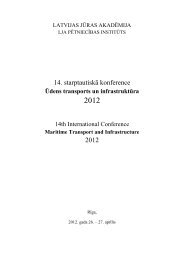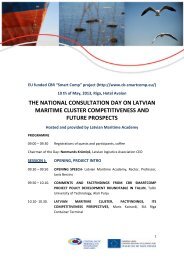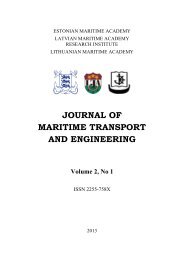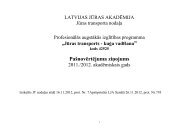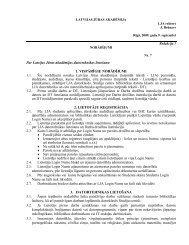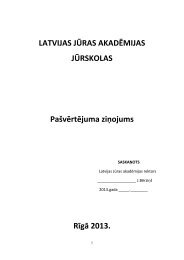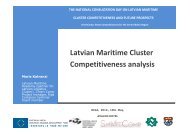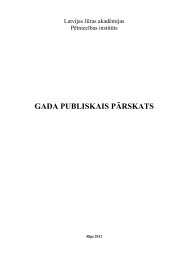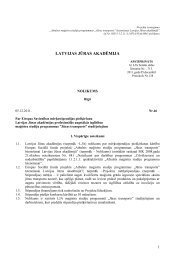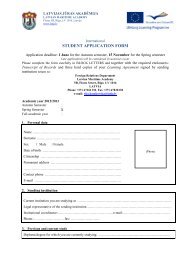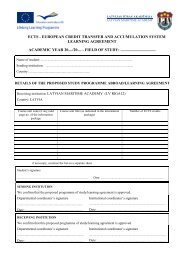Latvian Maritime academy
Latvian Maritime academy
Latvian Maritime academy
Create successful ePaper yourself
Turn your PDF publications into a flip-book with our unique Google optimized e-Paper software.
PROPOSED ADVANCED TRAINING AND EDUCATIONAL<br />
METHODOLOGIES FOR TANKER AND GAS INDUSTRY<br />
Wael Khattab<br />
<strong>Maritime</strong> Transport Technology Department<br />
Arab Academy for Science, Technology and <strong>Maritime</strong> Transport<br />
Abu Quir Campus, Alexandria, Egypt<br />
E-mail: waelmdkhattab@yahoo.com<br />
Ibrahim El Attar<br />
Nautical Studies Department, Port Training Institute<br />
Arab Academy for Science, Technology and <strong>Maritime</strong> Transport<br />
Port Foad - Yaqout Village, Port Said, Egypt<br />
E-mail: ibrahim.elattar@pti-aast.org<br />
Abstract<br />
Oil and gas are considered to be among the world's most precious resources. Hence, no doubtfully, the<br />
oil and gas industry plays a significant role in the global economy. Petroleum itself is used for numerous<br />
products, in addition to serving as the world's primary fuel source. Furthermore, the processes and<br />
technologies concerned in producing and distributing oil and gas are highly complex, capital-intensive<br />
and necessitate state-of-the-art technology. Nonetheless, human resources operating these technologies<br />
in a safe efficient mode are more important. This fact is a reason for the main concern. What will be ideal<br />
global unified education and training methodologies provided by <strong>Maritime</strong> education & Training<br />
institutes in such critical rather indispensable industry to ensure "Safer Seas & Cleaner oceans" (IMO<br />
1994)? This paper will illustrate ideal training & education methodologies to be delivered to crew in<br />
campus or rather on-board as well as highlights current conventions for promoting skills and inducing<br />
quality for such dedicated rather crucial industry.<br />
Keywords: advanced training, maritime education, tanker and gas industry.<br />
Introduction<br />
Global standards for seafarer have been a major concern for the maritime industry which has shown<br />
the way to the birth of the STCW 78. It was expected that it would promote competence of seafarers.<br />
Consequently, it was widely welcomed by the industry as it was the first convention ever to be delivered<br />
by the IMO setting global minimum standards for seafarers. Later the maritime society realized by that<br />
the convention had not achieved its purpose. This was mainly because it lacked accuracy in its standards.<br />
In addition, implementation of the convention was left to the “satisfaction of the <strong>Maritime</strong><br />
Administrations”. This resulted in different interpretations by various administrations, thus there was an<br />
immanent need for revision.<br />
After the implementation, all member states have adopted and amended their curriculum according<br />
to the new requirements during a transitional period of five years, yet no crucial evidence can be obtained<br />
with reference to major improvement to seafarer’s competence due to many new tasks that remain<br />
unfinished to give full and complete effect to the convention globally. As the seven years period since<br />
1997 has been both a success and failure, it appears now that with new technologies introduced onboard<br />
(i.e. ECDIS, AIS, Integrated Bridge Navigation Systems, and Automation with respect to minimum safe<br />
manning onboard) there is a need to revise STCW, to keep the convention dynamic as it is supposed to<br />
be.<br />
Nowadays one of the key differences between the latest edition of STCW and its previous versions<br />
is the stress on competence rather than knowledge. STCW amendments stipulate in detail the required<br />
competences associated with different tasks, the knowledge and understanding required to perform them,<br />
methods for demonstrating competence and criteria for evaluating it.<br />
The hydro carbon industry and transportation<br />
The Figure 1 shows a noticeable decrease or non ascending tanker - gas carries causality rate. At<br />
present, the aim of maritime society is the application of modern technologies to board ship in order to<br />
achieve a zero causality rate. Nonetheless, an eminent problem of unification of <strong>Maritime</strong> education &<br />
28



